July 14, 2018 | Riviera Suites, Thevara
Being aware of our laws and systems to protect women and other minorities from sexual harassment as a whole and specifically at workplace is crucial. As it stands now, a vast majority of women are unaware of what ‘sexual harassment’ really means and what they can do if they are a victim of it. The few who do, hesitate to come forth and bring the matter to public light or seek legal help. The discussion on July 14 helped raise awareness about sexual harassment, the laws, systems and structures that exist today to help women and also brought out the challenges faced by the aggrieved woman and the various stakeholders in this regard.
The gathering had people from various walks of life and background — From young women to experienced professionals, representatives from the bureaucracy, lawyers, social workers, media personnel and so on. The discussion did bring out many actionable solutions that we can implement to lessen the burden faced by the aggrieved women while reporting issues of harassment.
The kind of content and discussion that came out was immensely valuable and here, I hope to share some key points that were discussed along with my takeaways.
Schedule
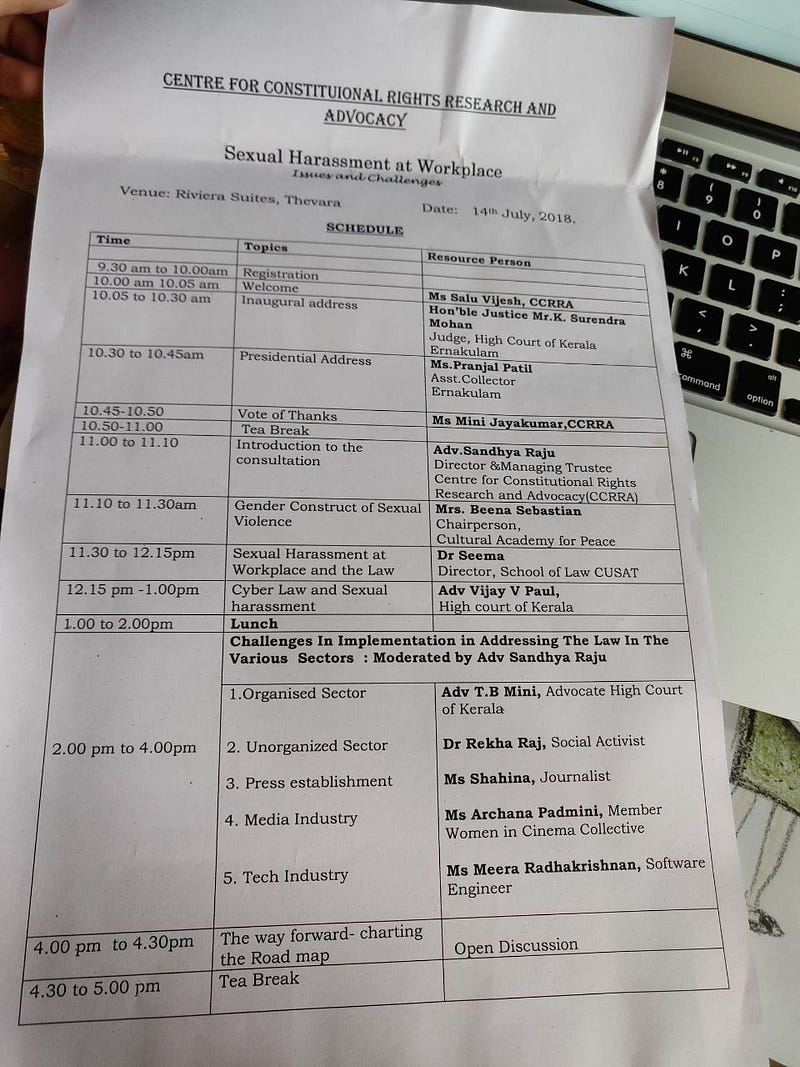
What they Said
Mr. K. Surendra Mohan, Judge, High court of Kerala, Ernakulam
Mr. Surendra seemed extremely supportive and understanding of the challenges we face as of today in implementing the POSH Act. He expressed deep concern about the magnitude of this problem that can potentially destroy lives of women. His talk urged us to bring forth collective action in mitigating challenges today.

For long, there has been tyranny of the strong over the weak.
Despite women taking leadership positions, they are exploited.
Fundamental rights is illusory to large sections of the population — people are undereducated, uninformed, not aware of rights and remedies.
Effort is being made to ensure that protection of law reaches these sections of people.
Every person’s body is sacrosanct. No one has the right to violate the body.
Women are worried about consequences of reporting abuse. Society looks at a harassed woman as a sinner.
People say — It’s a woman’s fault. It is her provocative way of dressing that caused all the trouble. But what she chooses to wear is her choice and it is no reason for someone to molest her.
- We need to put our heads together and think about what more could be done to enforce the law.
- We need to tell women they have been brave enough to come out and complaint.We need to expose people in the dark, violating rights.
Ms. Pranjal Patil, Asst. Collector, Ernakulam
Mr. Pranjal is India’s first visually impaired IAS Officer. The kind of maturity with which she spoke and addressed the challenges was extremely impressive. She appeared to have a clear understanding of the issues in the space and seemed extremely supportive in bringing forth corrective measures.
We have laws to protect women from sexual harassment at workplace — The Vishakha Guidelines.
According to the guidelines, having an ICC (Internal Complaints Committee) is mandatory. If the aggrieved woman feels that justice was not served, she can approach the LCC (Local Complaints Committee) or appeal in Civil Court.
There is a specific timeline that must be followed for the procedure —The investigation by ICC must be completed within 90 days. Similar timeline is applicable to LCC as well.
A 2017 Research by Chamber of Commerce reveals that less than 30% companies have constituted an ICC. Even among those that have constituted, awareness remains low.
Despite laws, crime reporting is low. In 2017, a total of 539 sexual harassment at workplace complaints have been received (4 complaints from Ernakulam)
Ms. Pranjal feels this is so because:
- Women accept the domination of men knowingly or unknowingly.
- Lack of confidence in the Justice system.
- Lack of awareness in informal sector.
The POSH Act is not explicit about way forward
- Fresh survey is needed on how many companies have constituted and how many ICCs functioning properly.
- Companies must submit Annual reports with clear mention of awareness workshops being conducted.
- Followup checking must be done to ensure that the report of ICC has been acted upon in all the cases.
- The sexual harassment act could be mentioned in termination letter of the abuser. Else they go to labour court, claim unlawful termination and bring forth further mess.
Adv. Sandhya Raju, Director CCRRA
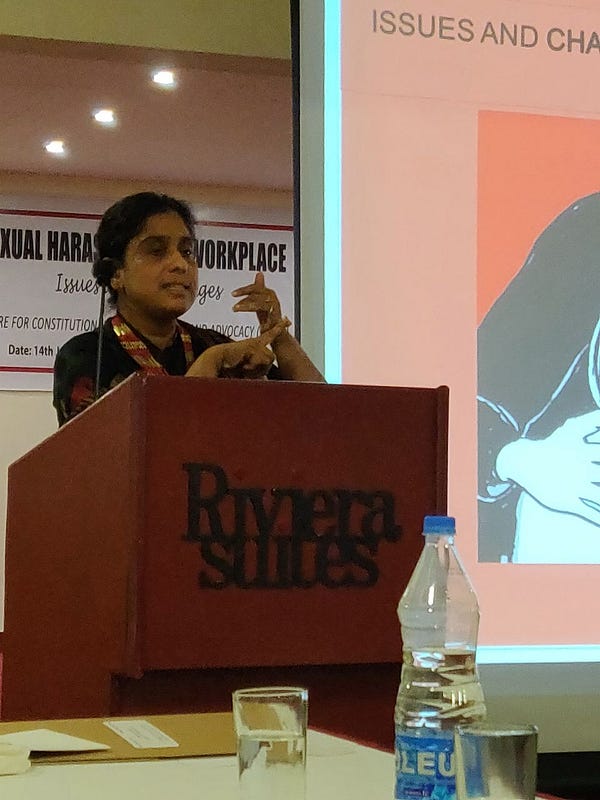
Adv. Sandhya offered perspectives on the practical implementation of the law and the challenges we face from her own experience as a lawyer and also as Director of CCRRA.

Action should be taken according to natural Justice and due process of law.

Justice should not only be done but also be seen to be done.
People conducting the inquiry should inspire confidence. All parties must feel that “I will be assured a justified hearing.”
When a woman reports a case, she doubts whether she will be believed.
Women brush aside things saying ‘Forget it.’
We must strive to spread awareness about these issues and also instil confidence and faith in our law and systems.
Mrs. Beena Sebastian, Chairperson, Cultural Academy for Peace
Smt. Beena is the chairperson for the Ernakulam LCC that has been recently constituted in addition to leading the Cultural Academy for Peace. She focussed on LCCs and the challenges in implementing ICCs, LCCs and serving justice to aggrieved women. She later went on to speak more about the gender construct of sexual violence.
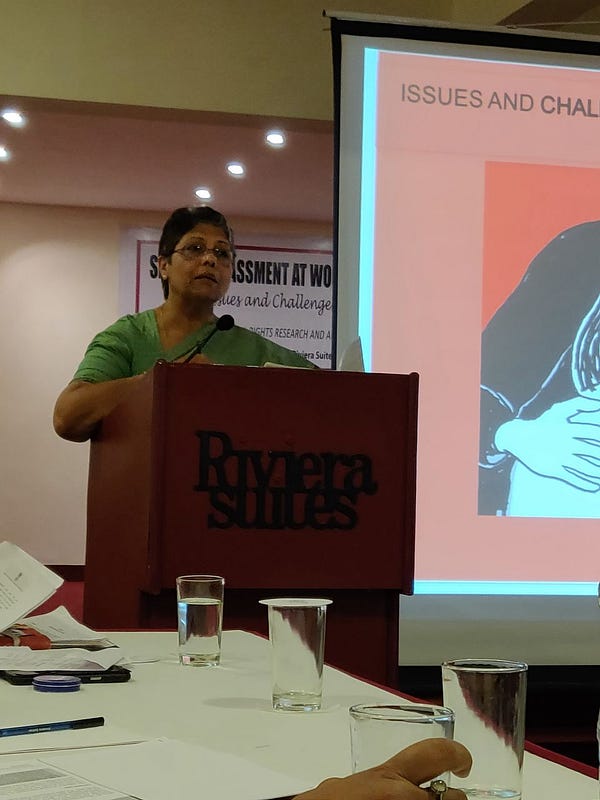
Patriarchy comes in the way of laws favouring women.
Attitude of implementing bodies matter during investigation of cases—including both men and women
Participation of men in the process is equally important. We need male allies who are supportive.
LCC for Ernakulam has been formulated recently. A woman may approach the LCC if she belongs to the unorganised work sector or if the perpetrator was the head of the organisation she worked for.
LCC, ICCs do not even have rooms to meet and discuss these cases. We have to assert and get ourselves private environments to discuss and resolve these issues.
LCCs should be constituted by District Collector in association with the Social Justice Dept. All ICCs should submit reports to District Collector (DC). The DC already has enough on his/her plate and often does not have the time or energy to invest towards the LCC. There is a need to have a dedicated officer assigned for the purpose of resolving cases of harassment.
As it stands now, we don’t know how many districts have an LCC constituted. We do know that Ernakulam and Trivandrum have LCCs constituted.
On Gender Constuct
Women put others before themselves.
Culturally, women aren’t encouraged to stand up for themselves. They are taught to be nice.
Women are treated as doormats.
Harassment is not just physical abuse. It also encompasses emotional and psychological abuse. Women don’t recognise harassment and abuse. Even if they do, they tend to deny it.
She asks: Why do women accept men passing sexually tainted comments and jokes? Is compliance a symbol of femininity?
We may comply because the person making these comments has the power to shape our career ad future. These people may be our superior officials.
We must stop jokes/ lewd comments objectifying women.
Women who react are isolated. That is why women hesitate to bring up issues.
There were many strong women who took up women empowerment and reacted to abuse. That brought out these laws and changes.
A key point of the POSH Act is maintaining privacy, confidentiality of the victim. To not disclose her identity or isolate her.
Many witnesses of harassment deny having witnessed it. In a particular case, all women witnesses of harassment denied it while the sole male witness spoke up about it.
Women don’t believe in the Justice system. Time taken to reach Justice, loss of privacy are also what women fear.
Every company is supposed to have a gender policy — it should be published. Names and contact numbers of committee members should be displayed and members of the committee should be able to put gender in perspective while making decisions.
There is no gender budgeting. State govt has not requested for funds from central govt. Govt is overlooking issues pertaining to women. Even if we draft proposals and solutions and request for funds to implement them, state govt does not take adequate action.
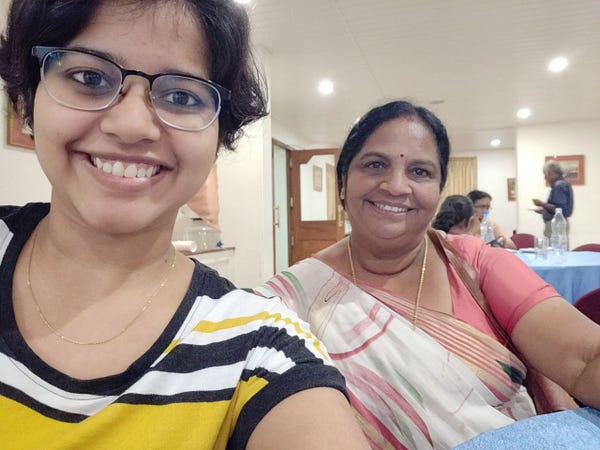
Sulochana Ramakrishnan has been filing RTIs to all government institutions in Kerala and checking in whether they have constituted an ICC. The results show that 13 out of 100 of these organisations do not have an ICC, including the Kerala Chief Secretary’s Office.
Dr Seema, Director, School of Law, CUSAT
Dr. Seema spoke about the POSH Act from strictly an academic perspective. She explained various segments of the Act and helped us understand what the Act reads.
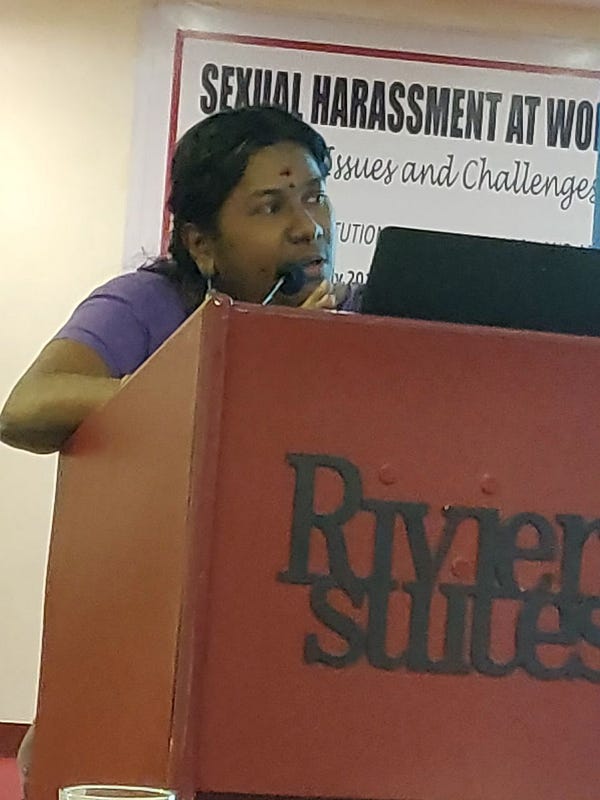
History of the POSH Act
In 1997, Visakha, a journalist was raped in Rajasthan which lead to the Visaka vs State of Rajasthan case. While there were existing laws that dealt with sexual harassment broadly (IPC 354 and 509), the Supreme Court held that sexual harassment at workplace violate the 3 basic constitutional rights of women — rights of equality, to practice any profession and to right to life with dignity.
Given the absence of a legislative structure to deal with SH at workplace, the court constituted the Visakha Guidelines based on CEDAW (Convention on Elimination of All forms of Discrimination against Women) which is an international convention put forward by the UN to deal with Sexual Harassment.
The Court also stated that the Vishaka Guidelines were to be treated as a declaration of law and were to be applicable until relevant protective legislation was enacted by the Parliament.
In 2007, Protection of Women against Sexual Harassment at Workplace Bill was introduced to the Parliament but it not get approved.
In 2010, the bill was reintroduced to the parliament and in 2011, a standing committee reviewed the bill and suggested few changes.
Finally in 2013, the POSH Act as we know today was published.
Here is a copy of the act:
http://wcd.nic.in/sites/default/files/Sexual-Harassment-at-Workplace-Act.pdf
Along with the POSH Act, the Supreme Court also published a set of implementation rules.
Here is a copy of the Rules:
http://wcd.nic.in/sites/default/files/Sexual-Harassment-at-Workplace-Rules.pdf
What does the Act Say?
Dr. Seems further discussed various components of the Act.
Few points she pointed out:
- The POSH Act is applicable only to women.
- The definition of Sexual Harassment is very wide and even making lewd remarks about a woman’s body or even staring at her body parts can be counted as sexual harassment.
- Sexual harassment can happen even without physical contact.
- The definition of ‘Workplace’ is also wide enough to include settings within office as much as with-out the office premises. For instance, a woman commuting to work in the official vehicle or visiting some place as part of her work will also account as ‘Workplace’.
- Every institution — commercial or non-commercial, irrespective of it’s size, sector or stage should constitute an ICC if it has over 10 employees. If the institution fails to do so, they may have to pay a fine of INR 50,000 and if they continue to not comply to the guidelines of the POSH Act, their business/trade license may be cancelled as well.
- Educational Institutions (Colleges) also need to constitute an ICC.
- If the perpetrator is not employed in the organisation same as the woman, the complaint goes to the police.
- Everything about the ICC is protected from RTI. Name of both the victim and respondent shoudn’t be revealed.
- The law says a victim must file the complaint within 3 months of abuse. However this is not a strict mandate. It is recommended that they file the complaint asap or within 3 months so that witnesses and evidence supporting the case are still available/accessible.
- It is not mandatory that the woman herself must put in the complaint. Anyone who is aware of the incident may drop in the complaint.
- The POSH Act comes into play only when the sexual advances were NOT welcome by the woman. If the woman is consenting to it, then it is not harassment.
An interesting perspective that came in from the audience: If the woman was NOT consenting to the sexual advances, but she hesitates to put in a complaint, it may be perceived as if she was consenting to the advances indeed.
To read in detail about these segments, you may either checkout the Act itself or checkout the following handbook by the Ministry of Women and Child Development.
https://www.iitk.ac.in/wc/data/Handbook%20on%20Sexual%20Harassment%20of%20Women%20at%20Workplace.pdf
Additional Resources
- India’s Law on Prevention of Sexual Harassment at the Workplace, Nishith Desai Associates
- Sexual Harassment Act and Rules, poshatwork
- Workplace Compliance Guidelines
PS: These are resources I found useful on the internet. These were not recommended by the speaker.
Adv. Vijay V Paul, Advocate at High Court, Kerala
Mr. Vijay spoke about the Cyber Law in our country and also how these protect women from sexual harassment.
The Information Technology Act, 2000 deals with laws regulating cyber crime.
Provisions within the IT Act regarding sexual harassment
Section 67 — punishment for publishing or transmitting obscene material in electronic form
Section 67A — punishment for publishing or transmitting of material containing sexually explicit acts in electronic form.
Section 67B — punishment for publishing or transmitting material depicting children in sexually explicit acts in electronic form.
The discussion then went on to the intermediary that’s involved in such acts. For instance, if someone posts sexually explicit content on youtube, then how far is youtube responsible, what are the actions we should ideally take and what remedies should the intermediary take?
Under the IT Act, an intermediary shall not be liable for any such third party communication provided, the intermediary does NOT
- Initiate the transaction
- Select the receiver of the transaction
- Select or modify the information contained in the transaction
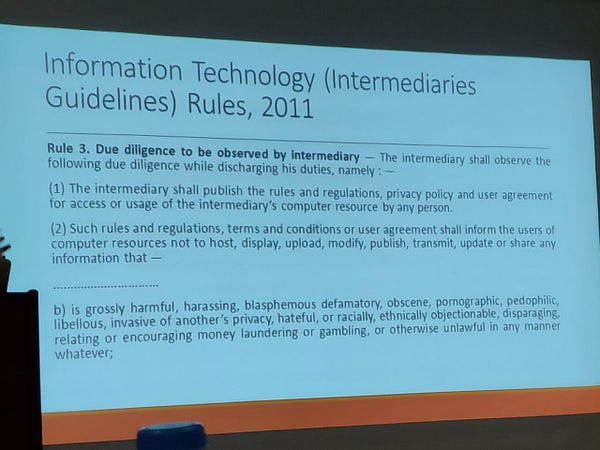
All intermediaries are bounded by the law to publish the rules and regulations, privacy policy and user agreement for access or usage of the intermediary’s online platform. These rules, regulations and policies should inform users to not publish, modify or share any information that is harmful, obscene/pornographic or breaches privacy and confidentiality.
(There’s more to this definition. Read full definition from the above image).
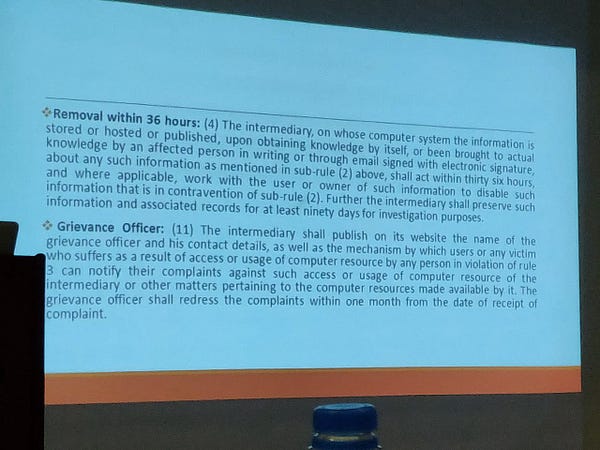
If we find any offensive material online or undergo harassment online, we may report to the intermediary on whose platform the content is posted by following the guidelines prescribed by them on reporting the breach. Upon receipt of this information, the intermediary is supposed to take action within 36 hours.
The intermediary shall also publish information about a Grievance Officer along with their contact details. We are also entitled to emailing the GO and the Officer, upon receipt of the complaint is expected to redress the complaint within one month of receipt of the complaint.
If you find any obscene material floating around in any of the Google products/platforms, here’s what you should do —
https://support.google.com/legal/answer/3110420?hl=en
You may also email the matter to removals@google.com.
If you feel that the intermediary is involved, then you may obtain an injunction from the District Munciff Court under Order 39, Rule 1 of the CPC. If the intermediary itself is the perpetrator, then you may file a complaint with the IT Secretary of the state.
In cases where the perpetrator is another person/organisation, you may file a complaint with the nearest police station or with cyber cell.
Mr. Vijay spoke very highly about the Kochi Cyber Cell. He says they are quite talented and adept at solving cyber crimes. Our cyber police is equipped to locate the perpetrator by tracing the IP address of their PC/laptop and the IMEI number of their mobile phone.
Challenges in Implementation of the Law and Open Discussion
In this segment, representatives from various industries shared their experiences and challenges pertaining to sexual harassment and implementation of the law.
Jotting down few points of discussion that came up:
- The term ‘Intersectionality’ was introduced in the discussion.
Quoting Wikipedia:
Intersectionality is an analytic framework which attempts to identify how interlocking systems of power impact those who are most marginalized in society. Intersectionality considers that the various forms of what it sees as social stratification, such as class, race, sexual orientation, age, disability and gender, do not exist separately from each other but are complexly interwoven.
- Anything to do with inclusion should include the minority.
Nothing about us, without us.
- ‘Speaking up’ is a skill we need to teach right from childhood.
- ‘Emotional Abuse’ is often overlooked as a small issue. Sometimes, emotional abuse can be even more harmful that physical abuse because in emotional abuse, the victim is repeatedly made to believe that she is not good enough or that she is at fault that she finally begins to internalise and believe it herself.
- Differently abled people and sexual minorities do not have explicit laws to protect them from harassment. The society has only begun to even recognise them and accommodate them.
- The movie industry has normalised verbal abuse. Power rests within certain associations of people which make it extremely difficult for the women to seek justice.
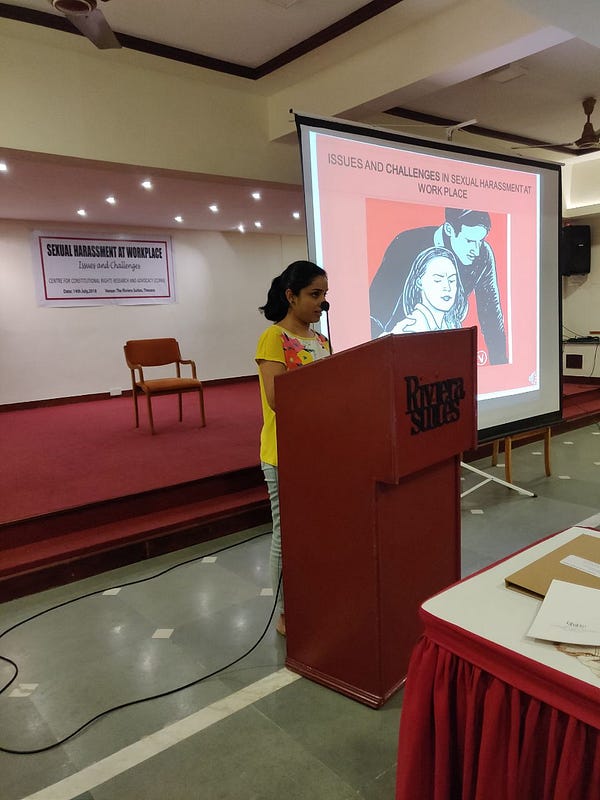
Meera Radhakrishnan shared her personal experience of having encountered sexual harassment. She quotes that it took her over a month and half to even recognise that she was being sexually harassed. Despite having over 200 employees, the organisation she was working with had no ICC constituted. An ICC was constituted when she reported the harassment, an investigation was carried out and few recommendations were put forward by the ICC. However, the redressal recommendations suggested by the ICC have not been executed till date, Meera claims.
When she finally returned to the organisation post the investigation, she noticed that her entire work environment had turned hostile and treated her ‘different’ than before. Employees of the organization were asked not to interact with her and she was given targets 3 times that of a normal employee, she says.
Meera brought to attention, the mental agony and cornering that a woman has to go through when she decides to put in a complaint. Despite the difficulty she had to go through, she maintained that the aggrieved woman shouldn’t be the one to leave the company but it must be the perpetrator that should.
Meera adds that men in her organisation were far more supportive than the women. She encourages people should “Call Out” whenever they see any sort of sexual harassment anywhere. She urges women to be supportive of other women and use our collective power to shout “Me Too, Its Time, Stop right here!”
Her bold comeback from the hostile environment instilled confidence in us to seek the justice that we truly deserve and speak up.
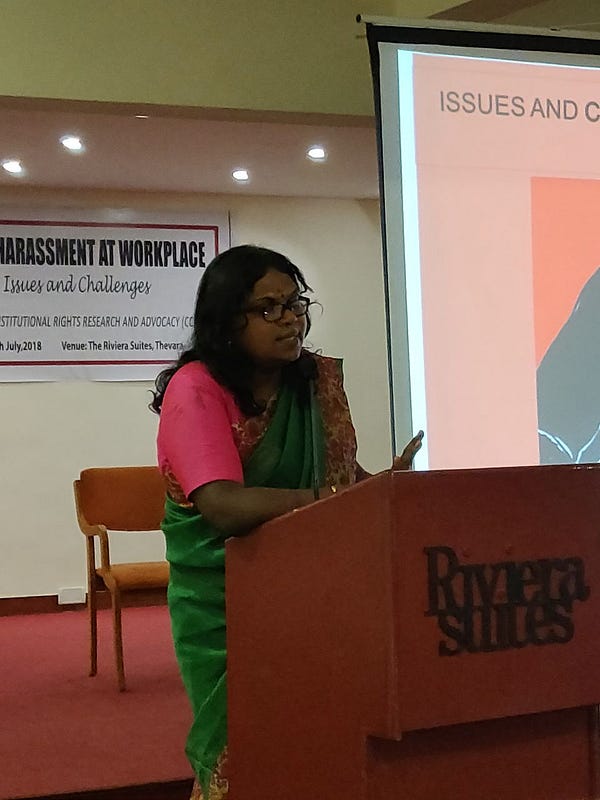
Vijayaraja Mallika, Kerala’s first transgender poet and social activist shared the challenges faced by the Transgender and intersex communities in Kerala. She says it was easy to find a job as a man but the moment she acknowledged that she was a trans woman, she was thrown out of her job and found it hard to find a new one as well.
- Sexual abuse among the LGBTQ community does not invite attention.
- There are no laws that protect the community from sexual abuse.
- When seeking a job, transgenders are forced to represent themselves as ‘women’. They are not accepted along with their identities.
- Transgenders are not granted jobs based on their merit. Workplaces demean them and pass discriminatory, derogatory comments at them.
She recalls the first job interview she had as a trans woman where one of the first questions the interviewers asked her was whether her breasts were real. Workplaces today are ill-equipped to deal with transgenders and often end up abusing/harassing them.
Recommendations and Conclusion
The workshop concluded with Adv. Sandhya summarising few recommendations that came up from the discussion.
Spreading awareness about sexual harassment and laws pertaining to it came up as one of the key action points. Conducting training sessions for women as well as setting up a pool of resource people for women to reach out to were few suggestions.
CCRRA hopes to put forward a formal list of recommendations in addressing the issues and challenges women face while reporting sexual harassment at workplace. Adv. Sandhya and team CCRRA remain hopeful that these recommendations will be duly considered and will make their way into the legal binding sooner rather than later.
My take-away
To me, personally, the workshop was extremely well organised. It was a bunch of right people under one roof, speaking about a topic that needed the attention it received. Extremely productive and actionable discussions came out.
General awareness about sexual harassment at workplace, best practices on preventing, prohibiting and redressing it as well as getting acquainted with our laws was one of my key take-aways.
The entire session and all the people involved urged us to take some action in mitigating sexual harassment and I personally felt compelled to do whatever possible in my capacity.
The realisation that we do have systems and stern laws to protect us, that we have ethically driven people leading some of these legal structures protecting us was indeed reassuring.
Finally, my biggest take-away was that a bunch of driven, committed individuals can bring forth change. What’s important is that we believe we can.
The crowd that day, despite being learned and strong, expressed apprehensions about bringing forth favourable changes to the existing laws. But Adv. Sandhya and other dignitaries reminded all of us that citizen action brought out the Visakha guidelines and eventually, the POSH Act in the first place. There has been history where we have been able to change the law and that we must continue to faith in our justice system.
The battle could be long one. It might take us a while to bridge the real-ideal reality gap. But meanwhile, what really is important is to have faith and continue to do what we are supposed to do so we get where we aspire to.
PS: I’m neither a law student nor a lawyer. Information stated in this blog is from the inputs received at the workshop. Care has been taken to explicitly differentiate my personal opinion from that of the speakers at the workshop.
If you feel that any information herewith has been misrepresented, kindly let me know. It would be greatly appreciated!
Any thoughts/feedback on the blog is also welcome. I can be reached at hello@aryamurali.com.